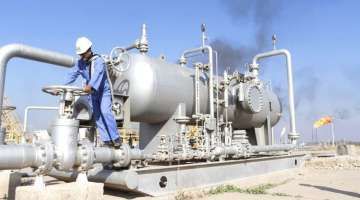India ready to clear $6.5 billion of Iran's oil dues, seeks clarity on payment channel
New Delhi: Keen to step up engagement in hydrocarbon sector with Iran, India has conveyed to the Persian Gulf nation that it was ready to clear nearly $6.5 billion of the dues for oil import
New Delhi: Keen to step up engagement in hydrocarbon sector with Iran, India has conveyed to the Persian Gulf nation that it was ready to clear nearly $6.5 billion of the dues for oil import from that country at the earliest, provided there was clarity on payment channel.
The message has been conveyed to Iran even as Prime Minister Narendra Modi is likely to visit the oil-rich country later this month.
Government sources said there has been a series of discussions at various levels both in Tehran and here and both sides were confident of resolving the issue soon.
"We are working on clearing the dues to Iran and are hopeful that the issue will be resolved soon," they said.
Following lifting of sanctions against it in January under a historic nuclear deal, Iran had terminated a three-year-old system with India of getting paid for half of the oil dues in rupees and has been insisting on being paid in Euros for the oil it sells to Indian refiners.
It has also scrapped free delivery of crude oil to Indian refiners.
Officials said though Western sanctions against Iran were lifted, problems persist in banking channels due to which regular transactions were not possible yet.
Refiners like Essar Oil and Mangalore Refinery and Petrochemicals Ltd (MPRL) owe nearly $6.5 billion in dues to Iran.
Since February 2013, Indian refiners like Essar Oil and MRPL paid 45 per cent of their import bill in rupees to UCO Bank account of Iranian oil company.
The remaining has been accumulating, pending finalisation of a payment mechanism.
Petroleum minister Dharmendra Pradhan and external affairs minister Sushma Swaraj had visited Iran last month during which they had conveyed to Iranian leaders that India wants to significantly ramp up engagement in oil and gas sector with that country.
The issue of the pending dues had also figured in the meetings.
Swaraj during her visit had conveyed to Iranian leadership that India wants to invest in joint ventures in oil and gas sectors in the Persian Gulf nation where foreign investors from major economic powers are rushing in to get early footholds after lifting of sanctions.
Following lifting of sanctions against Iran, India has been eying deeper energy ties with that country and has already lined up $20 billion as investment in oil and gas as well as petrochemical and fertiliser projects there.
New Delhi is looking to increase engagement with the sanction-free Iran by raising oil imports and possible shipments of natural gas. It also wants rights to develop Farzad-B gas field in the Persian Gulf discovered by OVL.
A deal for the field was not signed during Pradhan's visit as Iranian Parliament, Majlis, is yet to approve the new Iran Petroleum Contract (IPC) under which the Farzad-B field is to be given to the OVL-led consortium.
Indian firms have so far shied away from investing in Iran for the fear of being sanctioned by the US and Europe.
The same was deterring New Delhi from claiming rights to invest nearly $7 billion in the biggest gas discovery ever made by an Indian firm abroad.
But after the lifting of sanctions, India is making a renewed pitch for rights to develop 12.8 trillion cubic feet of gas reserves OVL had found in 2008.
Pradhan also conveyed to the Iranian side that both countries must expand the basket of oil and gas trade.
He had also expressed India's interest in importing LPG from Iran and said companies from both sides could discuss setting up of an extraction plant in Chabahar, if required.
India's total crude import in 2015-16 was around 184 million tonnes.
Iran had in November 2013 offered free delivery of crude oil to Indian refiners as tough Western sanctions crippled its exports. With shipping lines refusing to transport Iranian crude for fear of being sanctioned, Iran used its shipping line for the delivery and did not charge for transportation.
